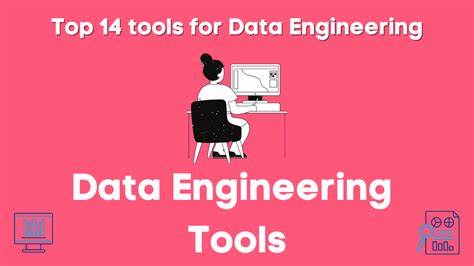Summary: As the demand for skilled data engineers grows in 2025, learning the right tools is essential for anyone looking to break into this field. Whether you’re a complete beginner or a student exploring career options, this guide highlights the top tools you need to master. These tools are industry-standard, beginner-friendly, and critical for handling big data, automating workflows, and creating efficient data pipelines.
Why Data Engineering Tools Matter?
Data engineering tools help professionals manage, process, and analyze massive amounts of data. These tools simplify complex tasks like cleaning data, building pipelines, and ensuring data quality. For beginners, learning these tools offers:
- Career Growth: Companies value engineers who can work with modern data tools.
- Efficiency: Tools automate repetitive tasks, saving time and effort.
- Scalability: They handle large datasets that manual methods can’t.
By mastering these tools, you’ll gain the skills to work on real-world projects and stand out in the job market.
Top Tools for Aspiring Data Engineers in 2025
- Python
Python is the go-to programming language for data engineers. It’s versatile, easy to learn, and widely used for data processing, scripting, and automation. Libraries like Pandas, NumPy, and PySpark make Python perfect for handling data tasks.
- Why Learn It? Python is beginner-friendly and powers many data engineering workflows, from cleaning data to building machine learning models.
- How to Start? Practice basic Python syntax, then explore data-focused libraries. Use free resources like Codecademy or Coursera.
- Use Case: Automating data extraction from APIs or transforming datasets.
- SQL (Structured Query Language)
SQL is the foundation of data engineering. It’s used to query and manage data in relational databases like MySQL, PostgreSQL, or Snowflake. Every data engineer needs strong SQL skills to extract insights and ensure data integrity.
- Why Learn It? SQL is universal and critical for working with structured data.
- How to Start? Learn basic queries (SELECT, JOIN, GROUP BY) and practice on platforms like LeetCode or Mode Analytics.
- Use Case: Fetching customer data from a database for analysis.
- Apache Spark
Apache Spark is a powerful tool for processing big data. It’s fast, scalable, and supports languages like Python (via PySpark) and Scala. Spark is ideal for handling large-scale data transformations and analytics.
- Why Learn It? Spark is widely used in industries like tech and finance for big data projects.
- How to Start? Begin with PySpark tutorials on Databricks Community Edition or YouTube.
- Use Case: Processing terabytes of log data for a company’s analytics platform.
- Apache Airflow
Apache Airflow is a workflow orchestration tool used to schedule and manage data pipelines. It ensures tasks like data extraction, transformation, and loading (ETL) run smoothly and on time.
- Why Learn It? Airflow automates complex workflows, a core skill for data engineers.
- How to Start? Set up Airflow locally and follow tutorials to create simple DAGs (Directed Acyclic Graphs).
- Use Case: Scheduling daily data updates for a dashboard.
- Kafka
Apache Kafka is a streaming platform for handling real-time data. It’s used to process and move large volumes of data between systems, making it essential for modern data architectures.
- Why Learn It? Real-time data processing is in high demand for applications like fraud detection and live analytics.
- How to Start? Explore Kafka basics with Confluent’s free courses or hands-on labs.
- Use Case: Streaming user activity data for a recommendation engine.
- Cloud Platforms (AWS, Google Cloud, Azure)
Cloud platforms like Amazon Web Services (AWS), Google Cloud Platform (GCP), and Microsoft Azure are critical for data engineering. They offer tools for storage (e.g., S3, BigQuery), computing, and analytics.
- Why Learn It? Most companies store data in the cloud, so familiarity is a must.
- How to Start? Begin with AWS free tier or Google Cloud’s free credits. Focus on services like S3, Redshift, or BigQuery.
- Use Case: Storing and querying large datasets in a cloud data warehouse.
- Docker
Docker is a containerization tool that packages applications and their dependencies. Data engineers use Docker to create consistent environments for data pipelines and workflows.
- Why Learn It? Docker simplifies deployment and ensures pipelines work across different systems.
- How to Start? Install Docker Desktop and follow beginner tutorials to create containers.
- Use Case: Running a data processing script in a containerized environment.
- Kubernetes
Kubernetes is a tool for managing containerized applications at scale. While advanced, it’s becoming a key skill for data engineers working on large, distributed systems.
- Why Learn It? Kubernetes is used in modern data architectures for scalability.
- How to Start? Try Minikube for local Kubernetes setups and explore basic tutorials.
- Use Case: Managing a cluster of containers for a data processing pipeline.
- Snowflake
Snowflake is a cloud-based data warehouse designed for scalability and performance. It’s popular for storing and analyzing structured and semi-structured data.
- Why Learn It? Snowflake is a leader in cloud data warehousing, used by many enterprises.
- How to Start? Sign up for Snowflake’s free trial and practice writing queries.
- Use Case: Building a data warehouse for business intelligence reports.
- Tableau or Power BI
Data visualization tools like Tableau and Power BI help data engineers present insights to stakeholders. While not core to data engineering, they’re valuable for collaboration.
- Why Learn It? Visualization skills make you a well-rounded professional.
- How to Start? Use Tableau Public or Power BI Desktop for free and follow beginner dashboards tutorials.
- Use Case: Creating a sales performance dashboard for a business team.
Ready to master these tools and kickstart your data engineering career? Join Bosscoder Academy for expert-led Data Engineering courses, hands-on projects, and personalized mentorship.
Conclusion
Data engineering is an exciting and rewarding career path, and learning the right tools is your ticket to success. From Python and SQL to Apache Spark and Snowflake, these tools empower you to handle data at scale and build impactful systems.



